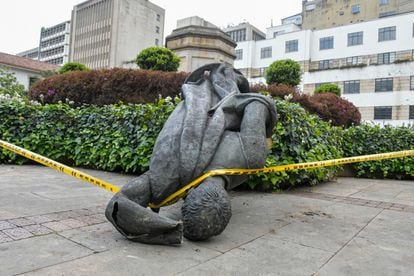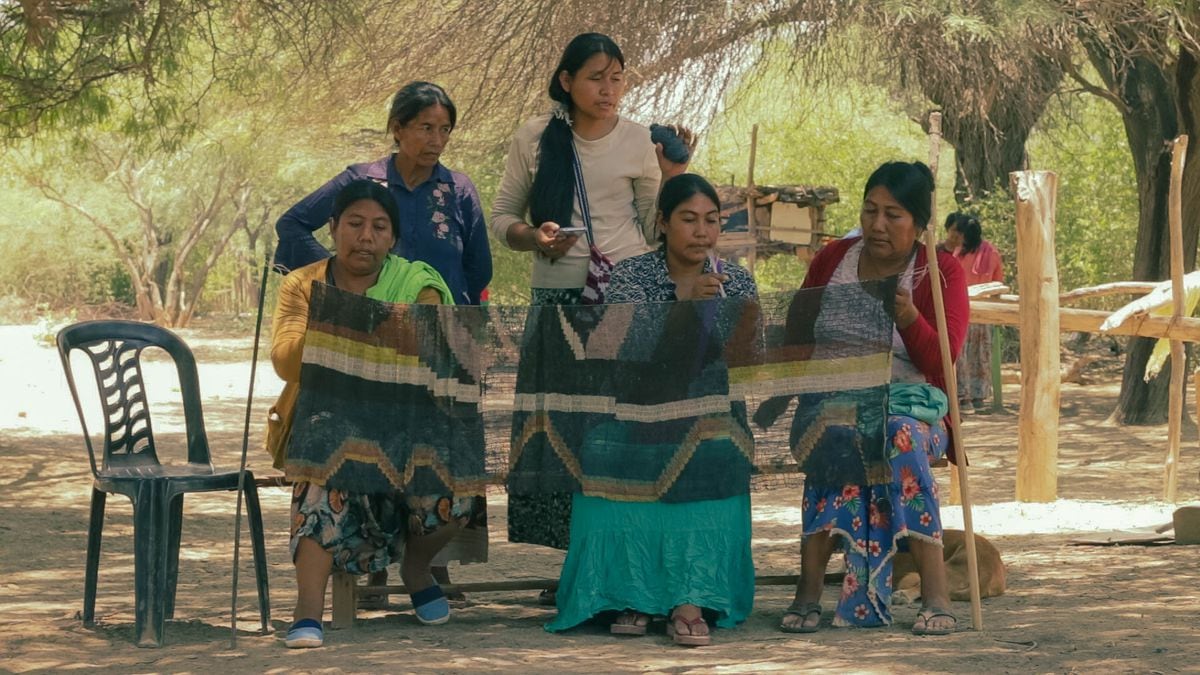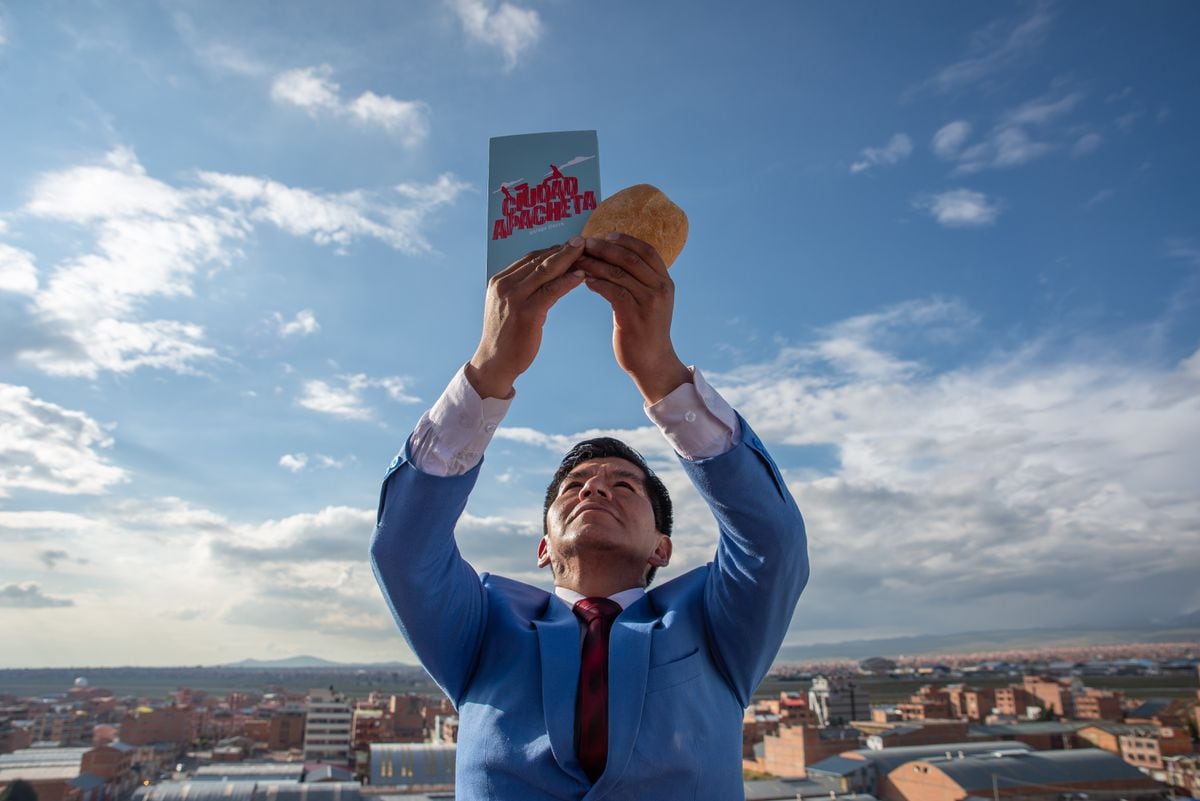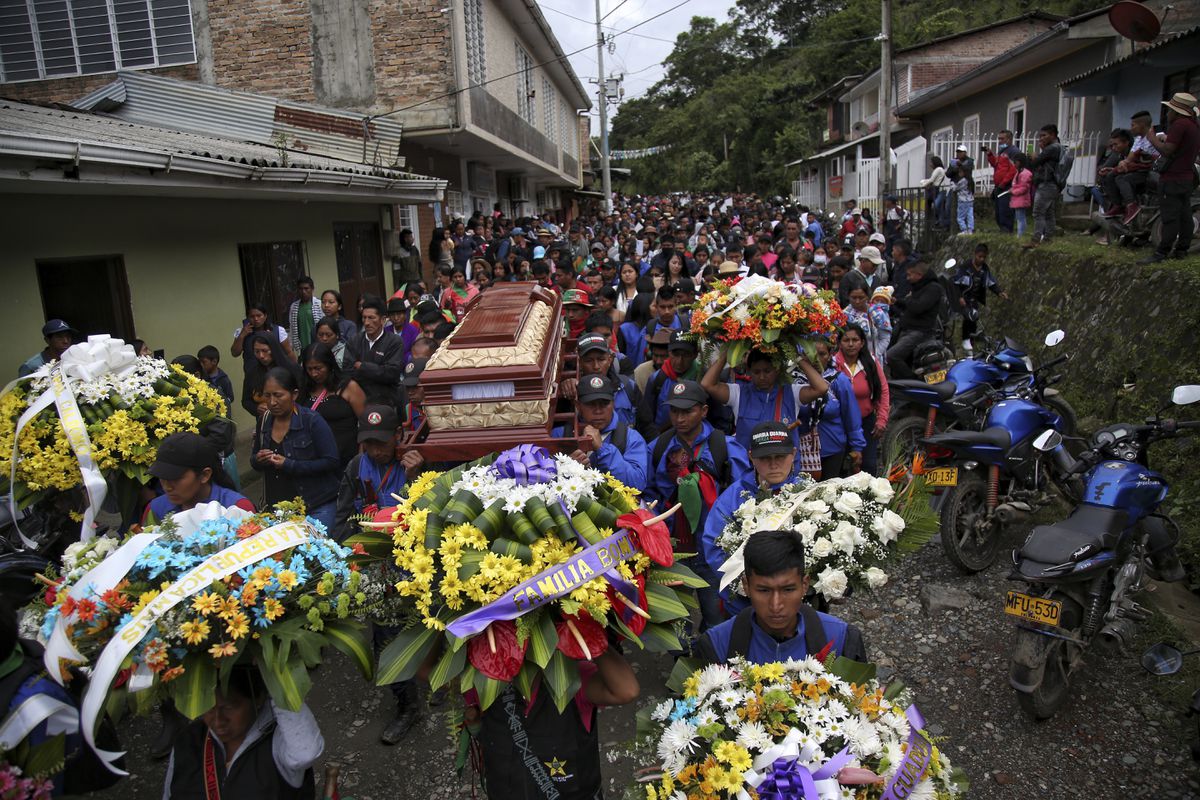The fallen statue of Gonzalo Jiménez de Quesada, demolished by Misak indigenous people, in the center of Bogotá.- / AFP
Gonzalo Jiménez de Quesada's turn has come.
The statue of the founder of Bogotá fell this Friday amid harangues and claims, toppled by a group of indigenous Misak.
The demolition of monuments of Spanish conquerors has reached the heart of the capital of Colombia for the first time in the framework of the so-called national strike, the massive protests against the Government of Iván Duque that have already been going on for more than a week.
The emblematic figure of Jiménez de Quesada (1509-1579) presided over the traditional square of the Universidad del Rosario, in the center of the capital, on Jiménez de Quesada avenue that was drawn over the San Francisco river, with very close links with the foundation and history of Bogotá.
In the Plazoleta - a few blocks from the Plaza de Bolívar and the Casa de Nariño, the Government Palace - there are landmarks such as the Café Pasaje, the place where the Independiente Santa Fe club was founded more than 70 years ago.
More information
The electoral climate conditions the exit from the crisis in Colombia
Colombian indigenous people demolish a statue of Sebastián de Belalcázar for the second time
Until now, the Misak had not demolished any statue in Bogotá, as they had done in the cities of Cali - last month - and Popayán with the monuments of Sebastián de Belalcázar, considered the founder of those cities. Both are located in western Colombia, near the Pacific corridor, and have a more marked Afro-descendant and indigenous heritage than the capital. The new wave of mobilizations against the Duque Executive, triggered by a failed tax reform, and the police repression of the protests, has once again been the pretext for these symbolic gestures.
As on those occasions, the movement of Indigenous Authorities of the South West has defended its action on social networks. "We continue our mandate to develop historic justice against crimes against humanity," the movement maintains in a kind of statement. “With the strength of the people we continue on permanent strike and call for a general strike in Colombia to advance, a strike capable of teaching those who have governed us for more than 200 years that governments must have respect for the Colombian people who build collective and popular power ”, they assure.
"We celebrate the fall of the symbol of the conqueror in our daily spaces," said a letter from students and graduates of Anthropology from the Universidad del Rosario, one of the oldest in the country, founded in 1653. The signatories, who far exceed one hundred, They express their full support for the act of the misak and call on the university to "not restore the statue, and call for the resignification of the public spaces that it co-manages with the city.
The indigenous leader Martha Peralta Epieyú, one of the first to react to the demolition, described Jiménez de Quesada as “genocidal”.
“
Today the genocide continues. During the Duque government, more than 190 indigenous leaders have been assassinated.
Stop the massacre, long live the national strike, ”said the president of the Indigenous and Social Alternative Movement (MAIS) on her social networks along with a video in which a group of misak is observed waving their flags on the empty pedestal while others interpret indigenous rhythms with flutes and percussions next to the fallen statue.
The National Indigenous Organization of Colombia (ONIC) has called for a mobilization in support of the Mizak people.
Indigenous Misak people have just knocked down the statue of the genocidal Gonzalo Jiménez de Quesada in the Rosario square, in the heart of Bogotá.
Today the genocide continues, during the Duque government more than 190 indigenous leaders have been assassinated.
Stop the massacre, long live the national strike.
pic.twitter.com/QDMzHUx60p
- Martha Peralta Epieyú (@marthaperaltae) May 7, 2021
The debate on the demolition of statues and symbols of figures associated with slavers or accused of racism has also occurred within the framework of mobilizations in other countries such as the United States. In Colombia, since the first time the misak demolished the equestrian statue of Belalcázar in Popayán, in September of last year, voices have appeared that celebrate it as an act of historical and cultural dignity while others censure it as an expression of violence that helps to warm the spirits in a difficult moment.
Protests in different cities have left at least 28 dead, according to the Ombudsman's Office, while Human Rights Watch has received reports of 36 deaths. Colombia woke up this Friday after a relatively quiet night after several days of anxiety amid all kinds of marches, riots and police brutality. Transport and commerce are kept at low speed and there are roadblocks throughout the country. The mobilizations have disrupted all kinds of activities. President Duque has started a dialogue with different sectors and this week he suspended his daily television program, which had been broadcast uninterruptedly for more than a year, when the pandemic broke out. In this framework, and as part of a diverse mobilization that includes workers' centrals and the student movement,some 6,000 indigenous people have come to Cali to activate the call
Indigenous
minga
as part of the national strike.
Subscribe here
to the
EL PAÍS América
newsletter
and receive all the information keys on the region's current affairs



/cloudfront-eu-central-1.images.arcpublishing.com/prisa/ZP4NWHUN7JACK2UZSAHGHFED3E.jpg)





